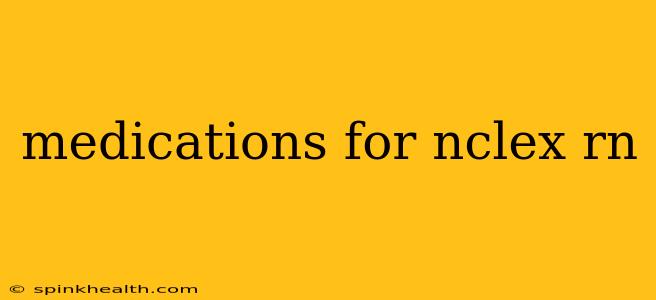Conquering the Medication Section of the NCLEX-RN: A Journey Through Pharmacology
The NCLEX-RN exam isn't just a test of knowledge; it's a test of your ability to apply that knowledge to real-world patient scenarios. And no area of nursing demands sharper application than pharmacology. The medication section can feel like a daunting mountain to climb, but with the right approach and a solid understanding of key principles, you can conquer it. This isn't just about memorizing drug names; it's about understanding their mechanisms of action, side effects, and appropriate administration. Think of it as a detective story, where you need to carefully piece together the clues to determine the best course of action for your patient.
Let's begin our journey, addressing some common questions and concerns that future RNs have about the medication portion of the NCLEX-RN.
What are the most frequently tested medication classes on the NCLEX-RN?
This isn't about a specific list of drugs; the NCLEX-RN focuses on your understanding of medication classes, not rote memorization. However, some classes consistently appear because of their frequent use and potential for serious adverse effects. These include:
-
Cardiovascular medications: This broad category includes drugs affecting blood pressure (ACE inhibitors, beta-blockers, calcium channel blockers, diuretics), heart rhythm (antiarrhythmics), and blood clots (anticoagulants, thrombolytics). Understanding the mechanism of action and potential interactions within this category is crucial. Imagine a scenario: a patient on multiple cardiovascular medications – how do you monitor for adverse effects? What are the implications of drug interactions? This is the level of critical thinking the NCLEX-RN assesses.
-
Antibiotics: Knowing the different classes (penicillins, cephalosporins, aminoglycosides, etc.), their mechanisms of action, and the importance of antibiotic stewardship is vital. The NCLEX-RN will test your understanding of appropriate antibiotic selection based on infection type and patient factors. Consider a case study: a patient presents with a suspected infection. What questions would you ask to aid in determining the appropriate antibiotic?
-
Pain medications: From simple analgesics like acetaminophen to potent opioids, understanding the different types of pain medications, their indications, side effects (especially respiratory depression with opioids), and the importance of patient education is paramount. Imagine this scenario: a patient is experiencing post-surgical pain. How do you assess the effectiveness of their pain medication? What are the potential risks of opioid use?
-
Insulin and other diabetic medications: This area requires a deep understanding of glucose metabolism, different types of insulin, oral hypoglycemic agents, and the importance of monitoring blood glucose levels. The NCLEX-RN may present a patient with altered glucose levels – can you determine the appropriate action, considering medication dosages and potential complications?
-
Psychotropic medications: Understanding the different classes of antidepressants, antipsychotics, and anxiolytics, including their mechanisms of action, therapeutic effects, and potential side effects (extrapyramidal symptoms, serotonin syndrome), is essential. The NCLEX-RN will likely test your ability to assess for these side effects and make appropriate interventions.
How can I best prepare for the medication questions on the NCLEX-RN?
Preparation for the medication portion of the NCLEX-RN involves a multi-pronged approach:
-
Understand the pharmacology concepts: Don't just memorize drug names; focus on the mechanisms of action, therapeutic uses, contraindications, side effects, interactions, and nursing considerations for each medication class.
-
Practice, practice, practice: Use practice questions and scenarios to apply your knowledge. Focus on understanding why a particular answer is correct or incorrect. This will reinforce your learning and build your critical thinking skills.
-
Use mnemonics and other memory aids: Develop strategies to help you remember important information, such as drug classifications, side effects, or nursing implications.
-
Focus on nursing implications: What are the nursing responsibilities related to administering medications? This includes assessing the patient, administering the medication safely, monitoring for side effects, and educating the patient.
What resources can help me study medications for the NCLEX-RN?
Many resources can help you prepare for the medication section of the NCLEX-RN. Your nursing school textbooks and supplemental materials are a great starting point. Consider utilizing reputable online pharmacology resources and NCLEX-RN review books. Remember to focus on understanding the underlying concepts, rather than just memorizing lists of medications.
What are some common mistakes students make when studying medications for the NCLEX-RN?
A common mistake is simply memorizing drug names without understanding their mechanisms of action or clinical significance. Another mistake is failing to connect medication administration with patient assessment and nursing interventions. Finally, neglecting the importance of critical thinking and applying knowledge to clinical scenarios is a major pitfall.
Conquering the medication section of the NCLEX-RN requires dedication, understanding, and strategic study. By focusing on the underlying principles, practicing with realistic scenarios, and utilizing various resources, you can transform this seemingly daunting challenge into a testament to your nursing expertise. Remember, this isn't just about passing a test; it's about preparing you to provide safe and effective patient care.

